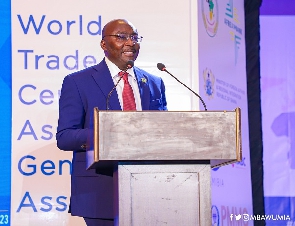 Vice President Dr. Mahamudu Bawumia
Vice President Dr. Mahamudu Bawumia
Civil Society Organisations (CSOs) and policy think-tanks operating in the education sector have kicked against the government’s intention to replace textbooks with laptops at the senior high school (SHS) level.
The CSOs, including the Africa Education Watch (Eduwatch), Ghana National Education Campaign Coalition (GNECC), and the Civil Society Organisations (CSOs) Platform on Sustainable Development Goals (SDG), which represent over 500 organisations advocating spending efficiency and equitable financing of education in Ghana, said laptops can never replace textbooks but only complement them.
They emphasised that no country in the world has replaced textbooks with laptops since there are challenges with using them. In Ghana’s case, the CSOs said some SHSs are not connected to electricity, and even those connected are struggling to pay electricity bills.
They therefore vehemently objected to plans announced by Vice President Dr. Mahamudu Bawumia to spend over a billion cedis on laptops for e-textbooks at a time when there are adequate printed textbooks in SHSs, but an absence of the same at the basic level. They described the decision as inconsistent with the austerity period Ghana finds itself in. More so, they questioned the reduction in the basic education budget and why the laptop money could not be channeled to support basic education instead.
The Executive Director of Eduwatch, Kofi Asare, outlined that on average each SHS has about 3,000 students – and considering the maintenance arrangement under the one teacher-one laptop initiative, any effective one laptop per student programme must be built on a school-based maintenance framework that employs full-time laptop repairers/technicians to provide real-time maintenance, technical support, and repairs to students.
Against this backdrop, he is emphatic that the financial capacity to afford such an expensive enterprise, bearing in mind the education sector’s huge financing gap, especially at the basic level, is not available; hence, the need to abrogate such a policy proposal.
“There is a fair amount of research establishing the fact that while laptops are useful learning resources that expose learners to an ICT culture and enable access to other relevant digital learning content, they cannot replace printed textbooks. The complementary role laptops play with textbooks is affirmed in international best practices for education.
“Years after going digital in high schools, governments of many advanced countries continue to provide printed textbooks to facilitate learning. This is simply because laptops cannot replace printed textbooks due to their level of reliability over laptops. Countries like Canada, the United Kingdom, and South Africa are useful case studies,” he said.
National Coordinator-GNECC, Bernice Mpere-Gyekye, stressed that the lack of prior consultation on major decisions by the Ministry of Education is a major challenge the government must address in the education sector.
She quizzed the source of data or research that informed the government’s decision to consider procuring laptops for 1.3 million SHS students as a replacement for printed textbooks. “Where is the feasibility study? When was this conducted, and which stakeholder engagement was undertaken on this report before taking such a billion-cedi decision? Were teachers consulted? Was academia consulted? What about parliament and CSOs working in the education space?”
On her part, National Coordinator-Ghana CSOs Platform on SDGs, Levlyn Konadu Asiedu, stated that SHSs across the country continue to struggle to find money to pay electricity bills due to systemic delays in releasing administrative grants under the Free SHS programme – leading to power cuts on several occasions.
She added that in the event of a power cut, students could be deprived of study hours.
“Administrative grants sometimes run into arrears of over a year, causing some SHSs heads to borrow money to run schools. As a result, the phenomenon of electricity in SHSs being disconnected by the Electricity Company of Ghana (ECG) for nonpayment of electricity bills will distort the lesson schedules,” she said.
Based on the above, the CSOs respectfully called on the government to immediately discontinue the initiative and ensure that basic schools have a full complement of textbooks.
“We call on parliament to reject any portion of this arrangement that appears before the House, especially an anticipated request for tax exemption. We will continue urging the Ministry of Education to consult stakeholders, including CSOs, before hatching such audacious initiatives,” the CSOs declared.
These calls were made at a press conference held in Accra to draw attention from the Chief of Staff, Office of the President, Minister of Education, and Chairman of the Parliamentary Select Committee on Education so they could abandon the proposal as a matter of urgency.
Building stronger basic education
According to the CSOs, there is an urgent need to invest in the basic education level, where they say quality remains very low.
For instance, over 5,400 schools are under trees across the country, while furniture remains a luxury for a majority of basic schools. Another challenge facing basic education is the absence of textbooks, the CSOs added, noting that teacher-to-student ratios in some schools remain unacceptable.
Therefore, they believe that the money the government intends to spend on laptops for SHS students could easily address most challenges at the basic level–which forms the core of any good educational system.
Watch the latest edition of BizTech and Biz Headlines below: